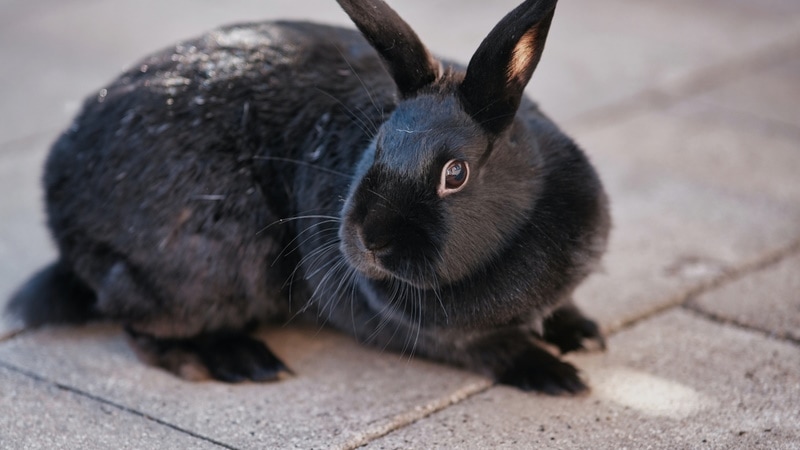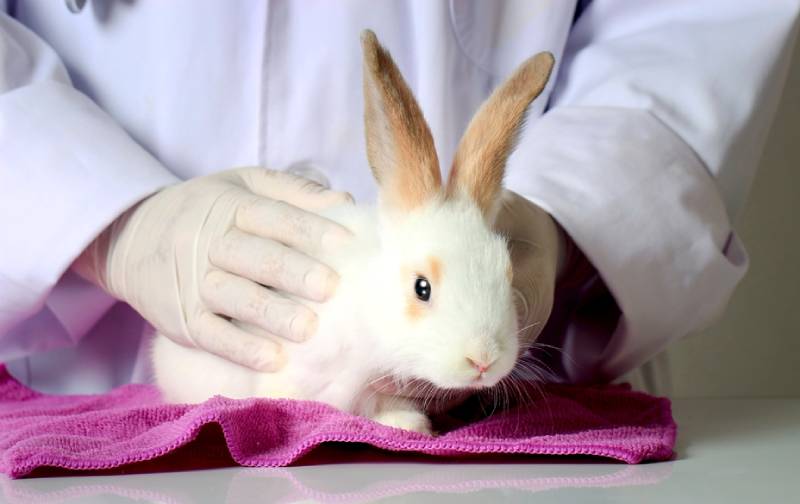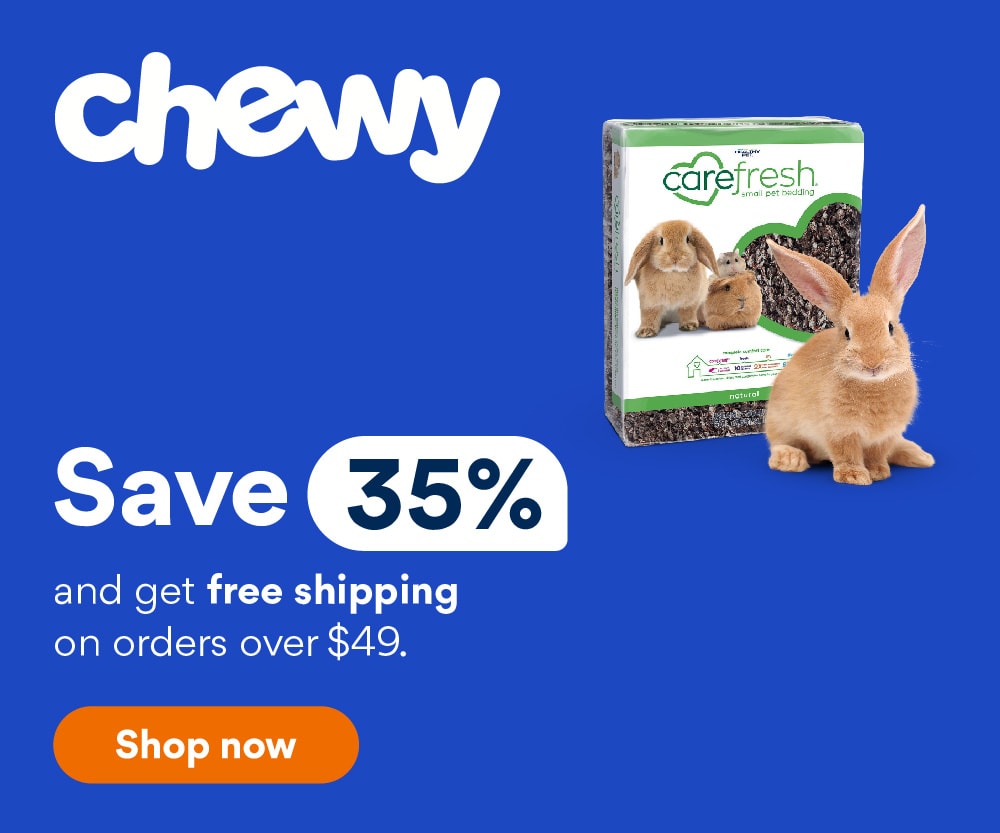What Foods Are Bad for Rabbits? 20 Vet-Reviewed Dangerous Picks
Updated on
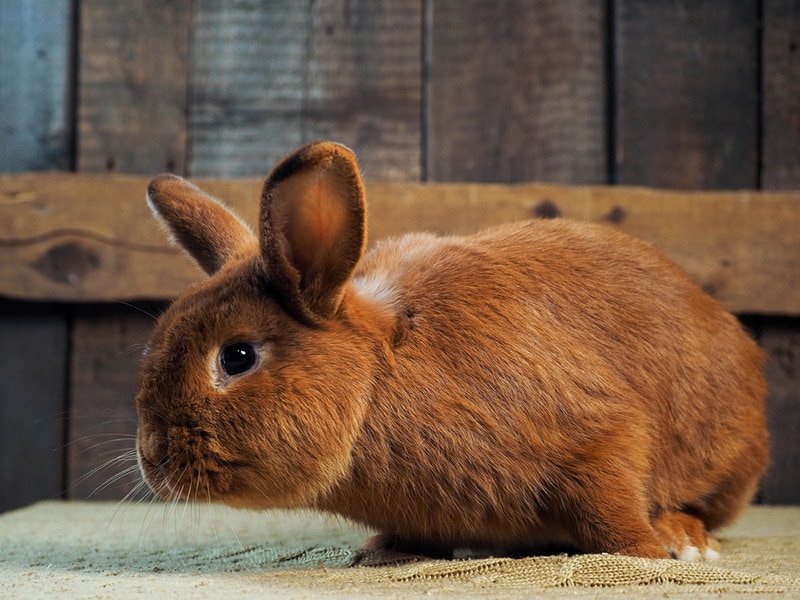
When we say a food item is bad for your pet, what do we mean? Foods can be “bad” for animals for various reasons.
First, they may contain toxic ingredients. For example, human foods like onions, avocado, xylitol, raisins, and chocolates are toxic for animals and may even be fatal. Second, some foods may be choking hazards. Large bones or meat chunks may be a choking hazard for meat-eating pets. Similarly, large pieces of fruit can also get lodged in animals’ throats. Or, like humans, animals can also have allergies.
Similarly, there are reasons that can render some food bad for rabbits, particularly as they are herbivores and their digestion is very sensitive and easily disrupted. But which foods specifically? Check out our list below to learn which foods to keep away from your pet rabbit.
This article is not a replacement for veterinary advice, and unfortunately, when it comes to many food ingredients, there is limited evidence based information on their safety and appropriateness for rabbits. Please consult with your vet when it comes to rabbit nutrition and safe food choices for your bunny.
The 20 Foods That Are Bad for Pet Rabbits
1. Yogurt Drops
Yogurt drops should never be given to rabbits, as bacteria present in dairy products are not a normal part of the rabbit’s intestinal bacterial population, increasing the risk of a severe disbalance and dysbiosis of this finely tuned digestive system.
On a second note, rabbits are not able to digest dairy products anyway, and eating them will cause serious gastrointestinal issues, gut stasis, and diarrhea, which can all be life threatening, while older research has also linked milk with rheumatoid lesions in rabbits.1
Yogurt drops are also rich in fat and sugar, which can cause obesity and digestive and dental problems if fed regularly to rabbits. While your pet might like the taste of yogurt drops, their digestive system is not designed to digest such a high sugar content.
2. Avocado
Avocado contains persin, a natural toxin that is quite harmful to most pets, including rabbits, birds, and rodents. The amount of persin in avocados depends on the fruit’s stage of ripeness, variety of avocado, and many factors during the fruit production and storage. All parts of the plant also contain this toxic compound. As the flesh rippens, the persin content reduces.2
Persin can cause serious digestive issues in rabbits and other animals, alongside pulmonary signs and mastitis in lactating animals. The leaves could also cause acute heart failure.3
3. Bread, Cookies, Crackers, and Pasta
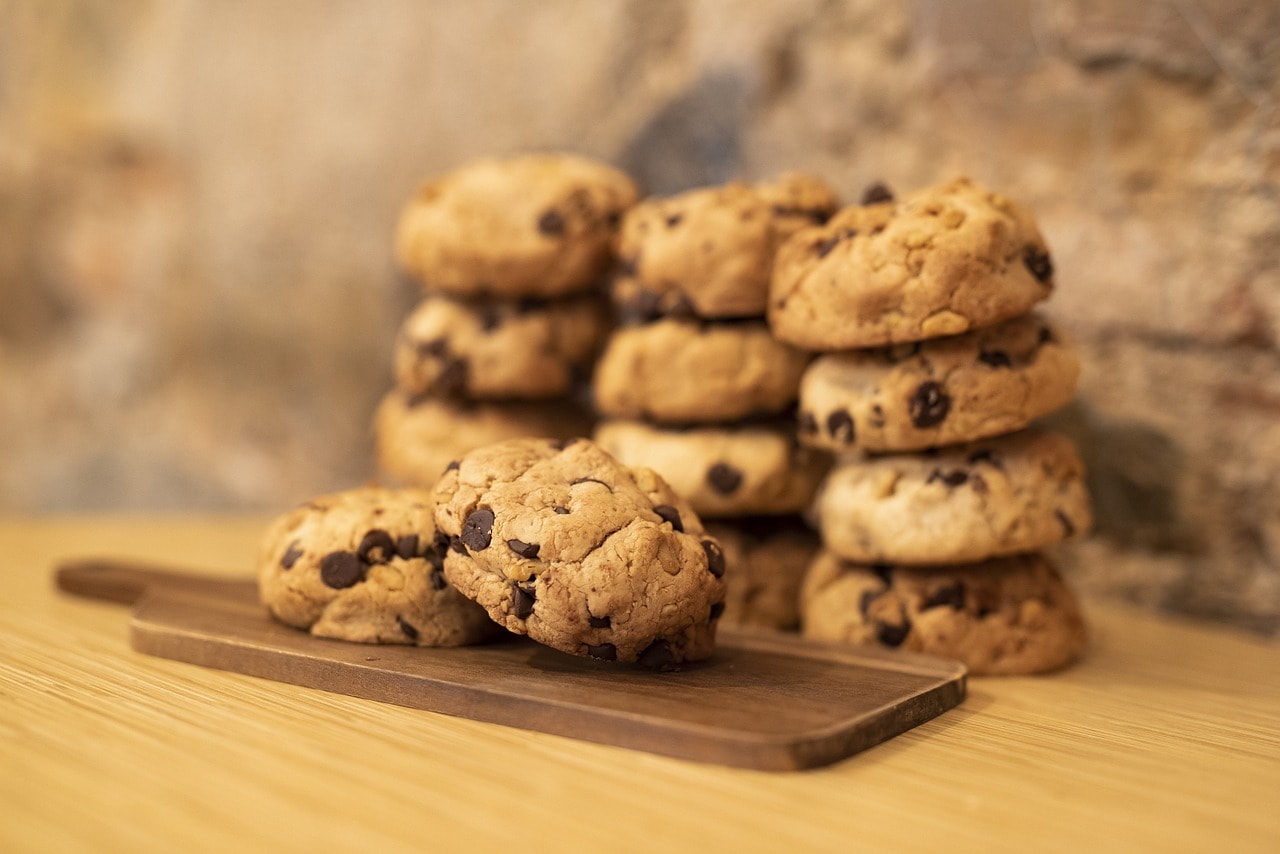
Any high-sugar treat is a no-no for your bunny’s diet. You might think these foods make good “cheat meals” for your rabbit, but they’re detrimental to your pet’s health.
Like yogurt drops, these foods can also lead to serious digestive issues and compromised balance of gut bacteria. The common signs include gut stasis, diarrhea, bloating, dehydration, abdominal pain, lethargy, loss of appetite, and more. These disorders can be life threatening for rabbits. Foods that are rich in carbs are not suitable for rabbits and will lead to obesity alongside digestive issues and dental issues due to improper teeth wear because of a lack of fiber.
Some rabbits can also die suddenly due to underlying digestive issues and pain without showing any obvious signs of illness, or at least very subtle ones. If you suspect your rabbit has eaten any of these foods, speak to your veterinarian immediately. Treatment options for digestive issues include fluid therapy and medication for pain management and gut peristaltic.
4. Rhubarb
Another food you should keep away from your pet rabbit is rhubarb. It is rich in oxalic acid, which can be harmful to rabbits depending on the amount. Ingesting too much oxalic acid can cause calcium absorption issues and damage to the rabbit’s mouth and gastrointestinal tract due to the crystal form of the compound.
- Painful and swollen mouth
- Loss of appetite
- Lethargy
- Dehydration
- Diarrhea
- Abdominal pain
- Bloat or distended abdomen
Although rhubarb’s stalks contain a lower amount of oxalic acid than the leaves, it’s best to keep the whole plant off your pet’s menu.
5. Iceberg Lettuce
A seemingly harmful vegetable, iceberg lettuce can also be bad for your rabbit, depending on the amount. Things get tricky when it comes to lettuce. Some varieties are good and healthy for rabbits, while others can disrupt their gut health. Iceberg lettuce is of the latter kind.
Iceberg lettuce contains lactucarium, a compound that may affect rabbits’ nervous systems and cause digestive issues.
Your bunny won’t mind skipping on this salad essential because it has little to no nutritional value for it.
6. Mushrooms
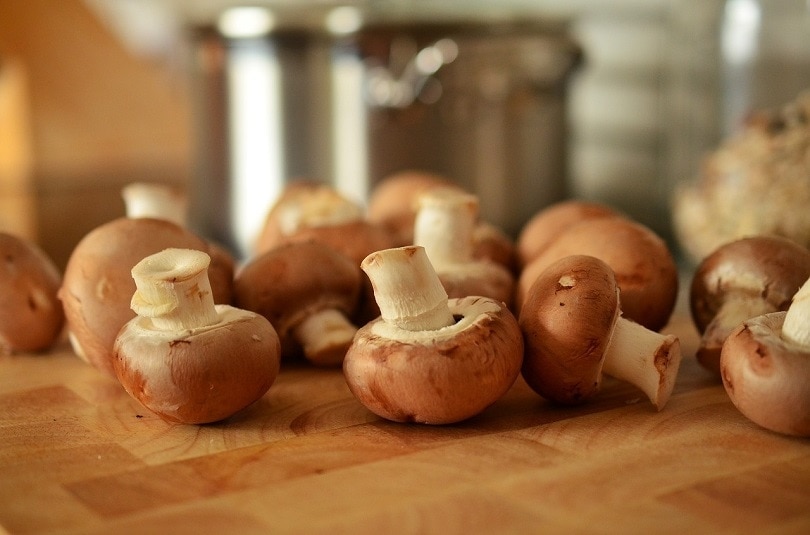
All types of mushrooms should be strictly avoided in rabbits, as many may contain mycotoxins. These toxic compounds can result in acute poisoning, causing digestive, neurological, and other health problems, such as liver damage.
They may affect the nervous system and disrupt proper organ functioning. Mycotoxins are particularly harmful because of their heat stability. That means even if you cook or process them, they’re still present in mushrooms and can harm rabbits who consume them.
7. Silverbeet
Silverbeet, like iceberg lettuce, should not be a part of your bunny’s diet because it can cause bloating and colic in rabbits. A colic rabbit will experience severe abdominal pain and will require immediate medical attention.
Replace silverbeet with high-fiber veggies, but ensure that hay makes up 85% of your rabbit’s diet. Some good veggie options include parsnip, romaine lettuce, watercress, and radish.
8. Potatoes
Who doesn’t love a good, crisp fry? Humans surely do.
But that doesn’t mean potatoes are good for our rabbit companions. Did you know rabbits’ digestive systems have the ability to process raw potato tubers? But the high starch content can cause serious digestive issues, so potatoes should never be given to rabbits.
Other cooked potatoes are no good, either. In fact, any type of cooked food should be kept off your bunny’s plate. Potato leaves and stems are very dangerous for rabbits as well, as they contain a toxic compound called solanine that may be fatal for your bunny.
9. Cauliflower

A small amount of cauliflower mixed with other leafy greens won’t harm your rabbit. But if you feed your bunny cauliflower daily, your pet will get bloated and gassy.
Some rabbits may have no issue digesting cauliflower, while others will easily develop abdominal pain and serious digestive disorders. This will require veterinary attention, as rabbits are likely to stop eating, which leads to further health complications, some of which may be fatal.
The same applies to other veggies in the brassica family too. These include Brussels sprouts and broccoli.
10. Hamster Food
If you’re a pet parent to both cousins—hamsters and rabbits—at the same time, you might think, what’s the harm in them sharing food? Well, hamster food won’t do much for rabbits since it doesn’t meet their nutritional requirements, and these two species have very different dietary needs and digestive processes. Rabbits are very sensitive when it comes to digestion, and eating hamster food may lead to gut stasis and disbalance in the intestinal bacteria.
Rabbits require a high fiber content in their diet that mostly comes from fresh hay, alongside small amounts of leafy greens. In the wild, hamsters eat a mix of plants and insects, and these two species should be distinct from each other when it comes to nutrition.
11. Onions, Leeks, and Garlic
These foods belong to the Allium family and are dangerous for dogs and cats. However, when it comes to rabbits, the answer isn’t very straightforward and remains controversial. Many pet websites warn against Allium plants as being toxic for rabbits on the same principle of causing hemolytic anemia, but reputable information on this is lacking.
Allium plants and extracts have been given to rabbits through research, showing effects on their immune system, metabolism, and liver and blood triglyceride levels, among others. From all of this information, we cannot safely conclude whether onions, leeks, and garlic are or aren’t toxic for rabbits, or at what amounts, so it’s important to speak to your veterinarian and be safe rather than sorry.
12. Acidic Fruits

Rabbits love eating fruits, and very small quantities of some fruits can be offered as a rare treat on a once weekly basis. However, fruits are not something rabbits would eat in the wild and should not be a part of their diet in all honesty. Most fruits, including limes, lemons, grapefruits, and oranges, can stress a rabbit’s digestive system too much and lead to diarrhea.
Stems, fruits, leaves, and peels of citrus plants contain a high amount of citric acid. However, there is limited evidence about safety or potential toxicity of citrus fruits for rabbits, so it’s important to consult with your vet and be cautious. Older research papers looked into feeding citrus pulp to production rabbits and have established an amount of the pulp that was quite harmful due to causing diarrhea and fatalities. But this was when citrus fruit pulp was fed as a regular part of their daily diet, which we know is not suitable or safe for rabbits and that certainly leads to severe health issues.
13. Caffeine and Chocolate
Coffee and chocolate contain a compound called methylxanthines, which is present in cacao seeds. When animals ingest methylxanthines, they initially develop diarrhea and vomiting.
- Panting
- Excessive urination
- Hyperactivity
- Tremors
- Abnormal heart rhythm
- Excessive thirst
Theobromine also causes testicular damage in male rabbits. Unfortunately research about the full extent of harmful effects of methylxanthines on rabbits remains scarce, and the toxic dose remains unknown. Keep your rabbits away from the pantry, especially if you store coffee beans and chocolates there. Note that dark chocolate is more harmful than white chocolate since it has a higher concentration of methylxanthines.
14. Alcohol
It goes without saying that alcohol is bad for animals, including rabbits. If an animal consumes an alcoholic beverage or food containing alcohol, they may experience the following signs:
- Central nervous system depression
- Sleepiness, disorientation
- Diarrhea
- Vomiting
- Increased thirst and urination
- Tremors
- Seizures
Alcohol consumption can cause serious health issues in a rabbit, as well as other pet animals, but the signs are not that well studied, and the ones listed above are extrapolated from signs seen in dogs and cats. However, research in rabbits has shown that alcohol can have detrimental effects on the heart. If you suspect your pet rabbit has consumed alcohol, you should immediately take them to the vet. You can also contact the ASPCA Animal Poison Control Center to learn more.
15. Parsnips
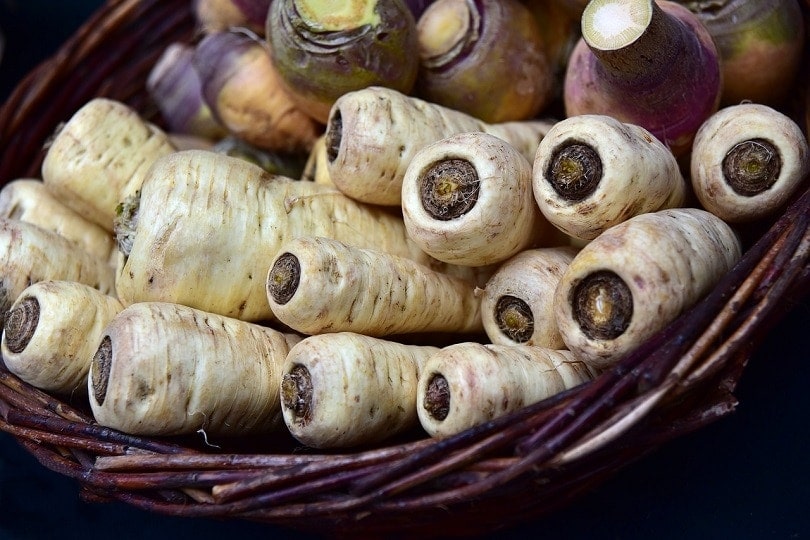
Psoralens are natural compounds found in plants, such as parsnips. These compounds are a part of the larger compound family called furanocoumarins, which are responsible for phototoxicity in plants.
Parsnips contain psoralens in the root’s outer layer or inside the skin. When administered on the skin and exposed to sunlight, these compounds cause phytophotodermatitis, a condition that results in blistering and skin inflammation. However, the research on direct effects of psoralen in rabbits is limited and mainly focused on use of psoralens for treating avascular necrosis of the femoral head induced by steroids.
Based on this information, we recommend you exercise caution and speak to your veterinarian in order to avoid any harmful effects for your rabbit.
16. Peanut Butter
Peanut butter is rich in fats and has a very sticky consistency, something rabbits should not eat. Rabbits might experience serious digestive issues upon consuming peanut butter.
17. Some Herbs
Herbs like mint, dill, coriander, sage, rosemary, and basil are great for rabbits. They’re highly nutritious and meet a rabbit’s daily dietary requirements.
But there are a lot of herbs that can be toxic to rabbits. Some of them include:
- Deadly Nightshade
- Figwort
- Foxglove
- Hemlock
These herbs contain various compounds that can be poisonous to rabbits. Also, avoid feeding fool’s parsley to rabbits. It looks like regular parsley but doesn’t have the same safety profile.
You should also keep nutmeg away from rabbits.
18. Cereal

You might think plant-based cereals should be safe for rabbits since bunnies eat plants anyway. Right? Not really.
Cereal, such as muesli, is not healthy for bunnies. They are rich in carbs and will lead to digestive and other health issues, including dental problems due to lack of fiber and improper teeth wear.
19. Nuts
Nuts, such as walnuts, pecans, and almonds, are harmful to rabbits because they contain a high amount of fats, carbs, and oils. Consuming nuts can cause diarrhea and serious digestive issues in rabbits, while their teeth are not accustomed to chewing on such foods. This may lead to choking.
20. Foods Containing Xylitol
Baked goods, gum, and candy are some foods that contain xylitol, a common sweetener in processed foods. Xylitol’s mechanism of toxicity is based on imitating sugar, which leads to insulin release, causing hypoglycemia or low sugar levels.
Initial signs of this condition include lethargy, loss of coordination, weakness, and seizures. Rabbits are also sensitive to xylitol, according to the Pet Poison Helpline, but there is lack of data about the expected signs of toxicity and dosage. Speak to your vet immediately if you think your rabbit had access to food containing xylitol.
Which Foods Should Rabbits Eat?
A rabbit’s diet should be based on predominantly hay, with small amounts of high-fiber vegetables, commercial pellet food, and water. Here’s what a rabbit should eat daily:
Water
Make sure your rabbit has access to clean water throughout the day. Most rabbits prefer water bowls instead of a drip-feed bottle.
Hay and Grass
Hay is rich in fiber and helps a bunny maintain their digestive system. Besides hay, you can also give your rabbits fresh grass.
Ideally, rabbits should be able to graze on dried grass. But if that’s not available, provide fresh hay to your bunny. Do not feed lawnmower clippings to rabbits, as it may contain harmful substances, such as pesticides, and make them ill.

Leafy Greens
A handful of fresh leafy greens are enough for a rabbit’s daily diet. Feed your bunny a mixture of at least five greens, such as kale, mint, parsley, broccoli, rosemary, cabbage, etc. They should not make more than 10% of their daily food intake.
Pellets
Feed 25 grams of pellets per kilogram of body weight to your rabbit. For instance, a 3-kilogram rabbit should get a maximum of 75 grams of pellets every day. Pellets should not make more than 5% of their daily food intake.
Besides these foods, you can also give some healthy treats to a bunny. These include small amounts of an apple without the seeds or carrot tops. But only give them in very small amounts, not more than once or twice per week, as excess can disturb a bunny’s stomach. Also, they would not eat fruits in the wild.
Conclusion
Rabbits have a very sensitive digestive tract that is easily disturbed and particular dietary requirements that are easy to follow if you base their diet on fresh, high-quality hay. The right blend of hay that makes up 85% of their daily food intake, followed by a small portion of leafy greens, pellets, and occasional treats can keep them healthy and well-fed. Health issues occur when these recommendations are not followed.
But some foods can harm rabbits due to their toxic ingredients and high carb or fat content. Likewise, rabbits may not have the right enzymes to digest some foods, such as milk and dairy.
As a pet owner, you should be familiar with the foods that can harm your bunny. Avoid feeding the foods mentioned in this guide to your pet, and if they consume these foods accidentally, consult a vet immediately.
Featured Image Credit: Irina Kozorog, Shutterstock



